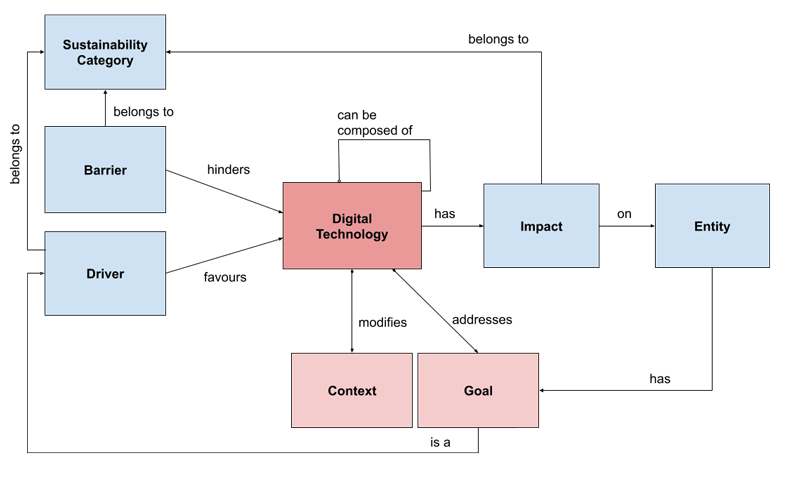by Alessio Ferrari (CNR-ISTI) and Manlio Bacco (CNR-ISTI)
We present a new paradigm of requirements engineering research for sustainability. This study proposes to go beyond stakeholders’ goals, and introduces the concepts of drivers, barriers and impacts of technology in a certain domain. We collect information about these constructs in an interview study with 30 experts on digitalisation in forestry, agriculture, and rural areas.
Sustainability in system engineering has traditionally been interpreted as the ability of a system to evolve and be maintained in a cost-effective way, while managing technical debt. This vision, which focuses only on the technical side of sustainability, has been criticised by the Karlskrona Manifesto [1], edited by a group of software engineering researchers to raise awareness on the relationship of Information and Communications Technology (ICT) solutions with ecological and social systems. The manifesto calls for a more systemic view of sustainability during system design, and identifies requirements engineering (RE) as the key area where system-level thinking can be applied to escape the trap of solutionism and broaden the perspective to reason on potential effects of technological change from the social, ecologic, ethical, and economic viewpoints.
The call to arms of the Karlskrona Manifesto triggered research around the notion of sustainability requirements. These are intended as quality goals that a system will fulfill to provide long-term benefits for its environment and members therein, while minimising damage to other members and the environment as a whole. Different RE approaches have been proposed to elicit this particular type of requirement. Part of them focus on energy-management aspects, and use different combinations of RE practices – prototyping, design thinking, goal modelling, etc. – specifically tailored to elicit requirements concerning the energy-efficiency of the system. Others take a domain-agnostic perspective and propose general sets of sustainability requirements patterns, interview scripts, as well as guidelines to rethink the software process considering sustainability as a main concern. However, existing strategies lack the proper high-level view to deal with the societal and long-term impacts of the transformation entailed by the introduction of a new technological solution.
Our research, conducted within the framework of the H2020 DESIRA (Digitisation: Economic and Social Impacts in Rural Area) project [L1], proposes to go beyond the concept of system requirements and stakeholders’ goals and raise the degree of abstraction by focusing on the notions of drivers, barriers, and impacts that a system can have on the environment in which it is deployed [2]. Drivers include goals of some stakeholders, for example, the need to improve the quality of products or processes by certain actors, but also other higher-level aspects, for example, the funding from institutions to support specific technologies. Barriers are intended as elements preventing the achievement of a specific goal, but are also more structural impediments that hamper the introduction of the digital technology as a whole in the given context. For example, the difficulty of certain actors in interacting with the novel technology, or the regulatory problems related to the use of a certain technology that does not account for privacy issues.
The concept of impact is intended as the expected effect that the digital technology can have from a sustainability standpoint, and thus in mid- to long-term. The impact can be positive, as, e.g., reduction of manual labour, but also negative, for example, due to the exclusion of subjects who cannot afford the technology. The informal meta-model depicting the relationships between these concepts is reported in Figure 1.

Figure 1: Meta-model representing the relationships between the concepts introduced in the study.
To put this vision into practice, we interview 30 cross-disciplinary experts in the representative domain of rural areas, and we analyse the transcripts to identify common themes. As a result, we provide drivers, barriers, and positive or negative impacts associated with the introduction of novel technical solutions in rural areas. Our results show that typical barriers to the adoption of ICT solutions are the lack of connectivity in rural areas, but also fear and distrust towards technology. In addition, the cost of technology and regulatory issues, also related to unclear data governance are relevant barriers.
The main drivers are economic, as technology can lead to cost reduction, but also ecological and institutional, since technology can improve monitoring as well as accountability. In this regard, regulators can play a crucial role by means of funding programs and norms. Positive impacts are the replacement of repetitive labour and the possibility of exploiting economies of scale. On the other hand, negative impacts are the higher dependency on technology as well as the social exclusion of some players that cannot cope with the change, at least not fast enough. This work contributes with a paradigm shift in the analysis of sustainability requirements, by introducing the concepts of drivers, barriers, and impacts associated with the adoption of technological solutions. Furthermore, our themes represent a reliable snapshot of the situation in rural areas and can be taken as a reference for the development of socio-technical systems in this domain.
Link:
[L1] https://desira.d4science.org/
References:
[1] C. Becker, et al., "Sustainability design and software: The karlskrona manifesto", in 2015 IEEE/ACM 37th IEEE International Conference on Software Engineering (Vol. 2, pp. 467-476), IEEE 2015. DOI: 10.1109/ICSE.2015.179
[2] A. Ferrari, et al., "Drivers, barriers and impacts of digitalisation in rural areas from the viewpoint of experts", Information and Software Technology, 145, 106816, 2022. DOI: 10.1016/j.infsof.2021.106816
Please contact:
Alessio Ferrari, CNR-ISTI,
Manlio Bacco, CNR-ISTI,











